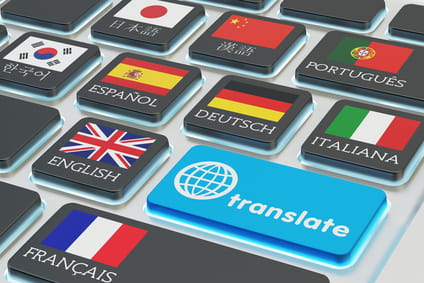Using a Business Interpreter

Interpreters or translators are valuable and essential tools required to settle many international deals.
“It must have got lost in the translation.” This lame excuse is not something an international business negotiator wants to use when an important deal collapses. They also don’t want to have an angry CEO, with beet-red face, waving a lawsuit from their foreign counterpart, and demanding to know what happened.
We conduct many of our hard-won international deals in English, which is commonly viewed as the international business language. However, many negotiations require the use of interpreters or translators. There are both positives and negatives to negotiating in English with someone who is not as persuasively affluent in our native tongue. Similarly, there are additional hurdles to overcome as well as prickly issues that can arise through the use of interpreters.
Are We Speaking the Same Language?
George Bernard Shaw noted that: “England and America are two countries separated by the same language.” Both countries have their own unique vernacular that is regarded as quaint or strange by the other. Imagine, then, what it must be like to be negotiating with someone from an altogether different culture and value system. That person is unlikely to be fully acquainted with all the subtle nuances that our own language entails.
It’s not especially difficult to negotiate with your foreign associate if they’ve been schooled in an English-speaking country. The situation changes if English is not a language in which they’re abundantly fluent, but may have “picked up” along the way—maybe even from watching old TV reruns.
3 Tips to Remember When Negotiating in English or in Their Language
-
No Showing Off
This is not the time to be acting smug and trying to impress the other side by practicing all those words you learned while spending your folks’ money on your business degree. Not only could this smarmy attitude be considered an insult, but it also shows disrespect to the other side. There’s also a very chilling but real chance you could end up alienating the other side completely or creating a shaky agreement that collapses or ends up in serious dispute later on.
-
Use the K.I.S.S. Method
K.I.S.S. is an acronym for “Keep It Simple, Stupid!” Clarity and simple language is the best approach. Basic words in everyday usage, and short sentences, will get the point across efficiently when negotiating. Speak slowly so as not to overwhelm the other side, who may have to perform some internal translation in their head to fully comprehend your message.
Have you ever had a conversation with a person and had to keep asking them to repeat what they just said again and again because you couldn’t understand them? Like a drunk, for instance. It’s quite annoying and frustrating, isn’t it? The point is that it can also be unproductive to be constantly repeating yourself or have to rephrase your message or proposal. The same applies to the person who’s trying to figure out what you’re trying to say. Keep it simple!
-
Do you really know what you’re saying?
Possessing the fluency to converse with your foreign equivalent can be a real plus in a negotiation. It conveys respect, and this carries weight. Showing respect can quickly facilitate a relationship. It enables you to bond more readily and gain a more rapid insight into their culture and value system. This can also lead to ascertaining their interests with greater ease.
However, if your language abilities are only mediocre, you’re going to get a quick but nasty lesson with regard to what it’s like to be in their shoes in a reverse situation. If neither side is very competent linguistically, it’s probably better to get a professional interpreter. Remember the lesson of our hapless negotiator in the first paragraph. You don’t want to be in their unfortunate shoes, do you?
Using Translators or Interpreters
Using translators or interpreters allows you the chance to give your complete attention to the negotiation itself. Both sides can negotiate more comfortably, which allows for a more productive environment.
However, there are drawbacks to consider. Using a translator distances the two sides. Reliance on translators can also make it somewhat awkward to develop a more personalized relationship. Secondly, if your interpreter isn’t as proficient as you thought, the context of translation could end up being “as clear as mud.“
There are two types of translation services that could be employed in international negotiations. The first is called simultaneous translations, whereby the translation is continuous. This type of translation service is generally used by larger international organizations or diplomatic functionaries. It requires specially trained interpreters and expensive equipment. The second type is known as consecutive translations, where one or more interpreter conveys your message in segment form. This latter type of translation service is the more common one utilized in international business negotiations.
Depending on their proficiency and fluency, you will need a translator who is fully fluent in both languages. Otherwise, you might need to consider using two translators so that one can translate your equivalent’s language into English. Likewise, a second translator can translate English into the other person’s language. Although this might sound strange, an interpreter’s language skills may not always be compatible with both languages.
7 Rules to Remember
1. Get their credentials
It is imperative that you employ a competent trained professional translator. Hiring any “hack” off the street just won’t do. This is especially important to remember if you’re hiring an interpreter from the country in which you are conducting business. The meaning of “having credentials” can vary a lot from country to country. Ask for references—and check all the references!
2. Brief your interpreter beforehand
You do not want to go into a negotiation without making your interpreter aware of what’s going to transpire. They are interpreters and not likely to be knowledgeable businesspeople. You should explain the background and circumstances of the deal to be negotiated. It is also vital you clarify whether you want a word-for-word translation or a summary.
3. Don’t ramble on and on
It is best not to be too talkative. Your translator probably won’t be able to accurately recall long pieces of information verbatim. This might cause confusion if the translator becomes mixed up, or it might make them miss important information. Speak in reasonable segments and ask your translator to ask you to speak up and repeat anything they need repeating to ensure accuracy.
4. Beware
Occasionally, an interpreter may try to take charge of the negotiation by putting in their two cents worth of business advice, particularly if they have some business background. They could have a special interest in the deal and perhaps want more business to come their way later down the road. Be especially cautious if the interpreter is a middleman or an agent.
5. Take a recess
Interpreting for long periods requires intense concentration and can be very taxing. Try and give your interpreter a break every hour or so, or suggest that they use their own initiative to pause when they feel they need it.
6. Treat your interpreter as a professional
The more respect and professional courtesy you display towards your translator, the more they will feel like a valued part of the team. This sense of importance could encourage your interpreter to offer you valuable insights into the cultural nuances or personalities of those sitting across the table.
Conclusion
Interpreters are valuable and essential team members who can greatly enhance your international deal-making. Take the time and don’t stint on getting a skilled professional to be a valued member of your team. Treat interpreters with professional respect and courtesy. Also remember the usual cautionary safeguards, as you would for any other third party you utilize in your daily business activities.
YOU MAY ALSO LIKE



